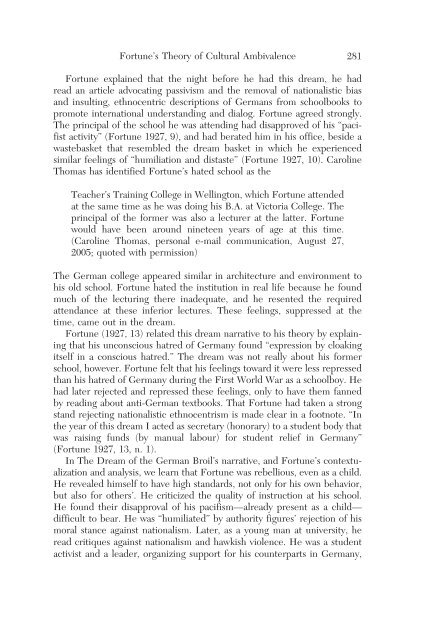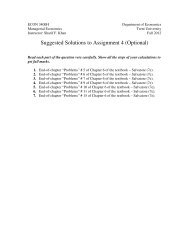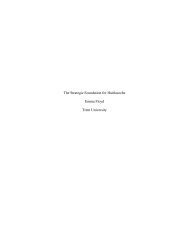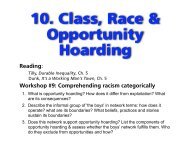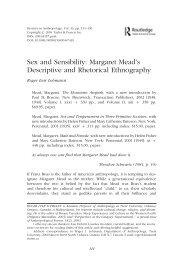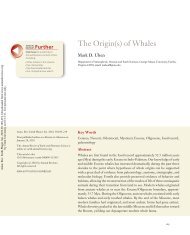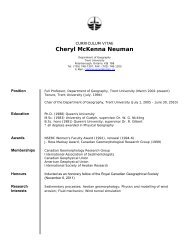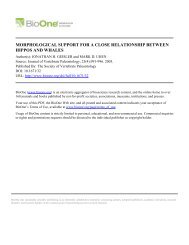REO FORTUNE'S PSYCHOLOGICAL THEORY OF CULTURAL ...
REO FORTUNE'S PSYCHOLOGICAL THEORY OF CULTURAL ...
REO FORTUNE'S PSYCHOLOGICAL THEORY OF CULTURAL ...
Create successful ePaper yourself
Turn your PDF publications into a flip-book with our unique Google optimized e-Paper software.
Fortune’s Theory of Cultural Ambivalence<br />
281<br />
Fortune explained that the night before he had this dream, he had<br />
read an article advocating passivism and the removal of nationalistic bias<br />
and insulting, ethnocentric descriptions of Germans from schoolbooks to<br />
promote international understanding and dialog. Fortune agreed strongly.<br />
The principal of the school he was attending had disapproved of his “pacifist<br />
activity” (Fortune 1927, 9), and had berated him in his office, beside a<br />
wastebasket that resembled the dream basket in which he experienced<br />
similar feelings of “humiliation and distaste” (Fortune 1927, 10). Caroline<br />
Thomas has identified Fortune’s hated school as the<br />
Teacher’s Training College in Wellington, which Fortune attended<br />
at the same time as he was doing his B.A. at Victoria College. The<br />
principal of the former was also a lecturer at the latter. Fortune<br />
would have been around nineteen years of age at this time.<br />
(Caroline Thomas, personal e-mail communication, August 27,<br />
2005; quoted with permission)<br />
The German college appeared similar in architecture and environment to<br />
his old school. Fortune hated the institution in real life because he found<br />
much of the lecturing there inadequate, and he resented the required<br />
attendance at these inferior lectures. These feelings, suppressed at the<br />
time, came out in the dream.<br />
Fortune (1927, 13) related this dream narrative to his theory by explaining<br />
that his unconscious hatred of Germany found “expression by cloaking<br />
itself in a conscious hatred.” The dream was not really about his former<br />
school, however. Fortune felt that his feelings toward it were less repressed<br />
than his hatred of Germany during the First World War as a schoolboy. He<br />
had later rejected and repressed these feelings, only to have them fanned<br />
by reading about anti-German textbooks. That Fortune had taken a strong<br />
stand rejecting nationalistic ethnocentrism is made clear in a footnote. “In<br />
the year of this dream I acted as secretary (honorary) to a student body that<br />
was raising funds (by manual labour) for student relief in Germany”<br />
(Fortune 1927, 13, n. 1).<br />
In The Dream of the German Broil’s narrative, and Fortune’s contextualization<br />
and analysis, we learn that Fortune was rebellious, even as a child.<br />
He revealed himself to have high standards, not only for his own behavior,<br />
but also for others’. He criticized the quality of instruction at his school.<br />
He found their disapproval of his pacifism—already present as a child—<br />
difficult to bear. He was “humiliated” by authority figures’ rejection of his<br />
moral stance against nationalism. Later, as a young man at university, he<br />
read critiques against nationalism and hawkish violence. He was a student<br />
activist and a leader, organizing support for his counterparts in Germany,<br />
pacs-32-02-06.indd 281 9/7/2009 2:32:33 PM


